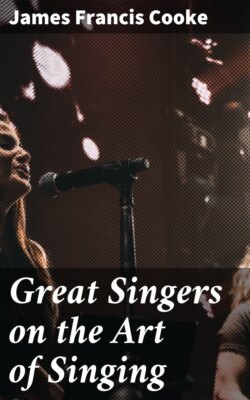Читать книгу Great Singers on the Art of Singing - James Francis Cooke - Страница 42
На сайте Литреса книга снята с продажи.
Preparing a Repertoire
ОглавлениеThe idea that concert and recital work is not as difficult as operatic work has been pretty well exploded by this time. In fact, it is very much more difficult to sing a simple song well in concert than it is to sing some of the elaborate Wagnerian recitatives in which the very complexities of the music make a convenient hiding place for the artist's vocal shortcomings. In concert everything is concentrated upon the singer. Convention has ever deprived him of the convenient gestures that give ease to the opera singer.
The selection of useful material for concert purposes is immensely difficult. It must have artistic merit, it must have human interest, it must suit the singer, in most cases the piano must be used for accompaniment and the song must not be dependent upon an orchestral accompaniment for its value. It must not be too old, it must not be too far in advance of popular tastes. It is a bad plan to wander indiscriminately about among countless songs, never learning any really well. The student should begin to select numbers with great care, realizing that it is futile to try to do everything. Lord Bolingbroke, in his essay on the shortness of human life, shows how impossible it is for a man to read more than a mere fraction of a great library though he read regularly every day of his life. It is very much the same with music. The resources are so vast and time is so limited that there is no opportunity to learn everything. Far better is it for the vocalist to do a little well than to do much ineffectually.
Good music well executed meets with very much the same appreciation everywhere. During our latest tour we gave almost the very same programs in America as those we have been giving upon the European Continent. The music-loving American public is likely to differ but slightly from that of the great music centers of the old world. Music has truly become a universal language.
In developing a repertoire the student might look upon the musical public as though it were a huge circle filled with smaller circles, each little circle being a center of interest. One circle might insist upon old English songs, such as the delightful melodies of Arne, Carey, Monroe. Another circle might expect the arias of the old Italian masters, Carissimi, Jomelli, Sacchini or Scarlatti. Another circle would want to hear the German Lieder of such composers as Schumann, Schubert, Brahms, Franz and Wolf. Still another circle might go away disappointed if they could not hear something of the ultra modern writers, such as Strauss, Debussy or even that freak of musical cacophony, Schoenberg. However diverse may be the individual likings of these smaller circles, all of the members of your audience are united in liking music as a whole.
The audience will demand variety in your repertoire but at the same time it will demand certain musical essentials which appeal to all. There is one circle in your audience that I have purposely reserved for separate discussion. That is the great circle of concert goers who are not skilled musicians, who are too frank, too candid, to adopt any of the cant of those social frauds who revel in Reger and Schoenberg, and just because it might stamp them as real connoisseurs, but who really can't recognize much difference between the Liebestod of Tristan und Isolde and Rule Britannia—but the music lovers who are too honest to fail to state that they like the Lost Chord or the lovely folk songs of your American composer, Stephen Foster. Mr. Plunkett Greene, in his work upon song interpretation, makes no room for the existence of songs of this kind. Indeed, he would cast them all into the discard. This seems to me a huge mistake. Surely we can not say that music is a monopoly of the few who have schooled their ears to enjoy outlandish disonances with delight. Music is perhaps the most universal of all the arts and with the gradual evolution of those who love it, a natural audience is provided for music of the more complicated sort. We learn to like our musical caviar with surprising rapidity. It was only yesterday that we were objecting to the delightful piano pieces of Debussy, who can generate an atmosphere with a single chord just as Murillo could inspire an emotion with a stroke of the brush.
It is not safe to say that you do not like things in this way. I think that even Schoenberg is trying to be true to his muse. We must remember that Haydn, Beethoven, Wagner and Brahms passed through the fire of criticism in their day. The more breadth a singer puts into her work the more likely is she to reap success. Time only can produce the accomplished artist. The best is to find a joy in your work and think of nothing but large success. If you have the gift, triumph will be yours.
